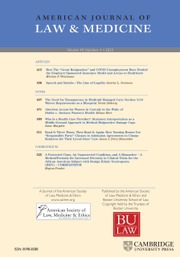Article contents
Roe v. Wade Is Constitutionally Unprincipled and Logically Incoherent: A Brief in Support of Judicial Restraint
Published online by Cambridge University Press: 24 February 2021
Extract
The Center for Judicial Studies is the only educational and public policy organization in the United States that focuses exclusively on the problem of judicial activism. It seeks to confine the power of the federal judiciary to the bounds envisioned by the Framers of the Constitution. The Center's brief was signed by fifty-six members of Congress who were concerned that Roe v. Wade “has expanded federal judicial powers into areas that are within the rightful legislative domain of Congress and the states.”
- Type
- The Webster Amicus Curiae Briefs: Perspectives on the Abortion Controversy and the Role of the Supreme Court
- Information
- Copyright
- Copyright © American Society of Law, Medicine and Ethics and Boston University 1989
Footnotes
This is a summary of the brief entitled “Brief Amicus Curiae of the Center for Judicial Studies and Certain Members of Congress in Support of Appellants.” The brief may be found at Congressional Information Service Microfiche, United States Supreme Court Records and Briefs, Webster v. Reproductive Health Setvices, Card No. 14.
References
1 410 U.S. 113 (1973).
2 Amicus Curiae Brief of the Center for Judicial Studies and Certain Members of Congress in Support of Appellants at 2, Webster v. Reproductive Health Servs., 109 S. Ct. 3040 (1989) [hereinafter Brief].
3 Reproductive Health Servs. v. Webster, 851 F.2d 1076 (8th Cir. 1988), prob. juris, noted, 109 S. Ct. 780 (1989).
4 Namely, those cases that upheld the right of the Congress and the states to deny public funding of abortion and the use of public medical facilities for abortion. See Harris v. McRae, 448 U.S. 297 (1980); Beal v. Doe, 432 U.S. 438 (1977); Maher v. Roe, 432 U.S. 646 (1977); Poelker v. Doe, 432 U.S. 519 (1977).
5 141 U.S. 250, 251 (1891).
6 Roe, 410 U.S. at 152.
7 Eisenstadt v. Baird, 405 U.S. 438 (1972) (statute prohibiting distribution of contraceptives to unmarried people held to violate equal protection); Griswold v. Connecticut, 381 U.S. 479 (1965) (statute prohibiting the use of contraceptives by married couple held to violate due process).
8 Botsford, 141 U.S. 250 (1891). For further discussion, see infra notes 13, 14 and accompanying text.
9 Stanley v. Georgia, 394 U.S. 557 (1969) (violation of first amendment freedom of speech to convict a person for possessing pornography in his own home).
10 E.g., Terry v. Ohio, 392 U.S. 1 (1968) (“patting down” a person reasonably suspected of a crime to discover concealed weapons held not to violate prohibition against unreasonable searches).
11 Pierce v. Society of Sisters, 268 U.S. 510 (1925) (statute requiring children to attend public, as distinguished from private, schools held to violate due process); Meyer v. Nebraska, 262 U.S. 390 (1923) (statute forbidding the teaching of foreign languages in lower grades held to violate due process).
12 Loving v. Virginia, 388 U.S. 1 (1967) (statute forbidding interracial marriages held to violate equal protection).
13 Prince v. Massachusetts, 321 U.S. 158 (1944) (law forbidding child labor held not to violate free exercise of religion rights of child's guardian).
14 141 U.S. 250 (1891).
15 Id. at 253.
16 Brief, supra note 2, at 12.
17 Roe, 410 U.S. at 153.
18 When litigants claim that they have a constitutional right to engage in a particular form of behavior that is not protected by the express terms of the Constitution, such as procuring an abortion, the Court usually engages in what has been called a balancing process. It weighs the importance of the interests the government is trying to protect by the challenged regulation against the extent to which upholding the regulation will undercut constitutional values that are expressed in terms. If the government's interests are reasonable and are in fact furthered by the regulation, and if whatever inroads the regulation makes on expressed constitutional values are not unreasonable, then the constitutional claim is rejected.
In some exceptional cases, however, the Court puts its thumb heavily on the side of the scale favoring the constitutional claim. It does this by invoking the “compelling interest” standard. That standard requires that the governmental interest be “compelling” if the challenged regulation is to be upheld. This means two things. First, the governmental interest must be one of overwhelming importance — as distinguished, say, from one that is merely significant. Second, the regulation must be “narrowly tailored” to achieve that compelling interest, which means that: (a) it must be essential to achieve that end; and (b) it must achieve precisely that end, no more and no less.
19 See, e.g., N.Y. Times v. Sullivan, 376 U.S. 254 (1964) (speech); Regents of the Univ. of Calif, v. Bakke, 438 U.S. 265 (1978) (race).
20 Roe, 410 U.S. at 163.
21 Brief, supra note 2, at 17.
22 Roe, 410 U.S. at 159.
23 Brief, supra note 2, at 18.
24 Roe, 410 U.S. at 159.
25 Brief, supra note 2, at 18.
26 See supra notes 13, 14 and accompanying text.
27 274 U.S. 200 (1927).
28 Roe 410 U.S. at 154.
29 Brief, supra note 2, at 15.
30 Id.
31 Id. at 19.
32 Bowers v. Hardwick, 478 U.S. 186 (1986).
33 Brief, supra note 2, at 3.
- 1
- Cited by


